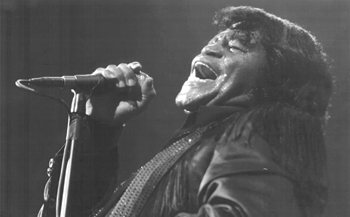![[Metroactive Music]](/gifs/music468.gif)
[ Music Index | North Bay | Metroactive Home | Archives ]
Getting Funky
Soul Brother No. 1 headlines the LBC
By Greg Cahill
Try going a day without bumping into James Brown. The hardest working man in show business is ubiquitous. This week alone I heard him singing about getting a brand new bag (and it wasn't the paper or plastic variety) while I prowled the grocery aisles. I later heard him hawking cars on TV, funkin' it up and letting us know that he's got the feelin' now. And I even caught him serenading commuters over oldies radio with the seemingly counter-productive plea to please, please, please, don't go.
Forget Elvis. Forget Jacko. Forget the Beatles. This son of a Georgia sharecropper, who as a kid danced and sang on the street for pennies and earned his education at the Alto Reform School, has sold more than 50 million records and left an indelible mark on the planet with his groundbreaking sound. As the Rolling Stone Encyclopedia of Rock and Roll puts it, "[Brown's] polyrhythmic funk vamps virtually reshaped dance music"--and, one might add, became a veritable one-stop shopping store for thieving DJs and beat-starved rappers.
And if that music lingers in the back of America's collective consciousness thanks to TV, radio, and mall Muzak, it has at times taken on an almost spiritual meaning for certain African musicians.
Case in point: the newly released Ghana Soundz, a hip compilation of funk-influenced '70s garage soul from the West African nation of Ghana. You might have heard about it this week during one of your frequent James Brown encounters; the CD was reviewed prominently on NPR radio, and Brown's influence was duly noted.
This scintillating slice of Afro-beat sizzles with obscure underground bands that coexisted in a sort of musical parallel universe at the same time Western audiences, newly smitten by Jamaican reggae, were embracing the stony, lilting rhythms of such Nigerian highlife acts as King Sunny Adé and, to a lesser extent, the heavy politico Afro-pop of Fela Kuti.
Most of the music on Ghana Soundz was never heard outside of Africa--until now.
According to the Rough Guide, following the overthrow of Pan-African leader Kwame Nkrumah in 1966, Ghanaian culture went into decline and the golden age of big-band highlife music stagnated as many musicians left for Nigeria and Europe. In the United States, Britain, and especially France, that exodus fueled the growing hunger for world music.
Then in 1971, the Ghanaian capital of Accra got on the good foot when it hosted the Soul to Soul festival, which featured Ike and Tina Turner, Wilson Pickett, the Staple Singers, Santana, and Roberta Flack, among others. That, in turn, helped launch a new movement in which young Ghanaian musicians starting incorporating funk and R&B into highlife.
And those freshly enlightened Ghanaian funksters quickly became enthralled by the black pride and sweaty funk first pioneered by Brown and his jazz-educated cohorts Maceo Parker, Pee Wee Ellis, and the other members of the Famous Flames.
While the bands on the 14-track Ghana Soundz are wildly diverse in their own ways, they all share one thing in common: All were doin' it to death to those irrepressible down-D, funky-D James Brown funk grooves. You can hear it loud and clear in Marijata's "Mother Africa" and again on Honny and the Bees' "Psychedelic Woman"--and yet again on funk-flavored songs by the Sweet Talks and the Ogyatanaa Show Band.
The brainchild of British record producer Miles Cleret, who spent two years collecting these rare dance tracks, Ghana Soundz already is proving so popular among Afro-beat revivalists that two more volumes are in the works.
Meanwhile, James Brown steps center-stage in the North Bay in a big way when he brings his nonstop rhythm and soul revue on Thursday, June 19, at 8pm to the Luther Burbank Center for the Performing Arts, 50 Mark West Springs Road, Santa Rosa. Tickets are $55-$125. 707.546.3600.
[ North Bay | Metroactive Central | Archives ]
Copyright © Metro Publishing Inc. Maintained by Boulevards New Media.
![]()

Hit Machine: James Brown's influence spreads far beyond minimall Muzak and oldies stations.
From the June 12-18, 2003 issue of the North Bay Bohemian.